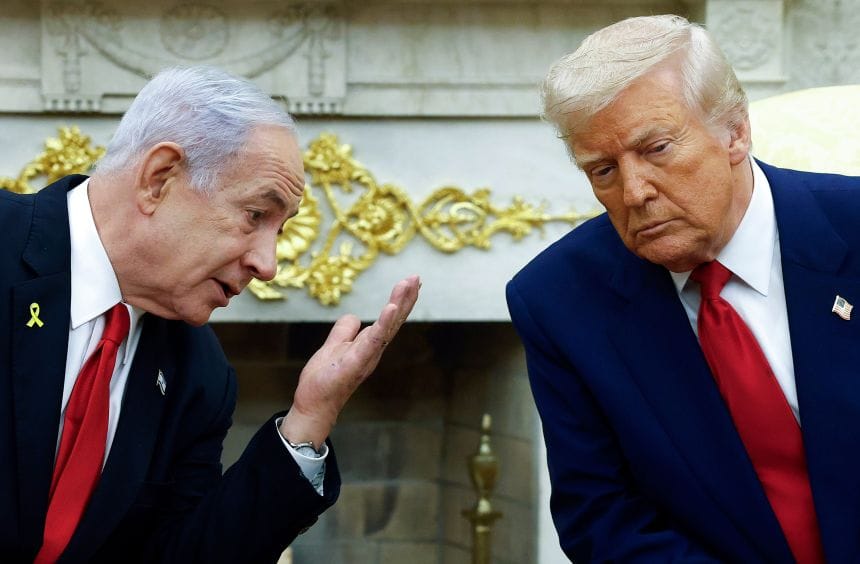Trump & Netanyahu Talk Ceasefire as Palestinians Warn of Another Betrayal

Washington, D.C. – U.S. President Donald Trump and Israeli Prime Minister Benjamin Netanyahu are set to meet today at the White House, where discussions will center on a possible ceasefire in Gaza. But for Palestinians, the talks evoke more fear than hope. After years of broken promises, ceasefire breaches, and devastating assaults, many believe this meeting may bring only another chapter in Israel’s cycle of war crimes and betrayal.
A Ceasefire Framework That Raises More Questions Than Answers
The U.S. has circulated a 21-point plan, described as a framework to end hostilities and chart Gaza’s political future. Among the main provisions are:
- An immediate ceasefire.
- The release of all hostages, both living and deceased, within 48 hours.
- Phased Israeli withdrawal of military forces from Gaza.
- The dismantling of Hamas’s arsenal and removal of Hamas from power.
- Amnesty or safe passage for Hamas members who commit to peaceful coexistence.
- Explicit recognition of no forced displacement of Gazans.
- A transitional administration in Gaza, unaffiliated with Hamas, until a reformed Palestinian Authority can govern.
- Reconstruction of health, education, and housing infrastructure, backed by international funding.
- Unrestricted humanitarian aid delivery.
- International security coordination with regional states.
- A political pathway toward a Palestinian state.
Yet, many Palestinians warn that these promises are unlikely to hold. For them, past ceasefires have been little more than political cover for Israel to regroup and resume its assault.
Netanyahu’s “Conditions”
Netanyahu has doubled down on Israel’s red lines ahead of the meeting. He insists there can be no agreement without the complete dismantling of Hamas, the release of hostages, and the demilitarization of Gaza.
His rhetoric raises alarm for Palestinians who fear that such conditions are a pretext for prolonging the war. The prime minister has framed Israel’s military operations as defensive necessities, yet human rights groups and UN experts continue to accuse Israel of committing grave breaches of international law.
Trump: “Everybody Wants to Make the Deal”
Trump, meanwhile, has projected optimism. “We’re getting a very good response because Bibi wants to make the deal too,” he said. “Everybody wants to make the deal.”
He added that the ultimate aim is “peace in the Middle East, more than Gaza. Gaza is a part of it. But it’s peace in the Middle East.”
War Crimes and a Humanitarian Catastrophe
Behind the political theater, the reality in Gaza remains catastrophic. Hospitals, schools, displacement camps, and homes have been obliterated. Hundreds of thousands of Palestinians are feared to have been murdered and many more wounded, according to a report by Dr Gideon Polya & Professor Richard Hill.
Rights groups say Israel’s conduct - from indiscriminate bombings to collective punishment - amounts to war crimes. Journalists and aid workers have been relentlessly targeted, detainees mistreated, and humanitarian corridors deliberately obstructed.
A Fragile Moment - A Test of Intent
Today’s Washington meeting is more than just a diplomatic handshake. For Palestinians, it is a test: will the US continue to allow Israel to destroy diplomacy under a false illusion of peace in a tomorrow that never comes, or will they finally demand accountability and enforceable guarantees?
If the “21-point plan” becomes another vague document riddled with loopholes, Palestinians say they already know what will follow: bombings, death, and broken promises.
But if this meeting results in wider binding commitments - especially since Palestine is now more recognised as a state by western powers, any ceasefire, may come with international enforcement and respect for Palestinian life and sovereignty - it could be for many, a turning point.
Until then, grief and distrust linger. As one Palestinian asked, a question echoing across Gaza:
“Will this ceasefire be any different, or just the latest in a long line of betrayals?”
For many, the talks are a distant spectacle - yet the outcome could decide whether their children live another day in fear or take their first steps toward normalcy.
Fatima al-Jammal, who has endured the horrors of the last two years, described the exhaustion shared by countless families. “I hope a deal is reached, and that the war ends,” she told Al Jazeera.
“Two years of this, it’s too much. What’s happening is unjust.”
For her, a ceasefire is not only about silence in the skies but about reclaiming a stolen future. “Isn’t it enough that our children have lost their future? No schools, nothing - even hospitals have no proper treatment,” she said, emphasising her hope that schools could reopen and that life might return to how it once was before the war consumed every corner of Gaza.
Others echoed the same mixture of despair and longing. Mohammed Khudair said the simple wish of most Palestinians was to live in dignity and security. “I hope to see joy on children’s faces again,” he said, “for them to live in peace, safety and security, away from fear, misery, hunger and tragedy.”
His words reflect a broader reality: even in the shadow of destroyed homes, shuttered schools, and crippled hospitals, Palestinians still imagine a day when their children can laugh freely without the constant terror of Israeli airstrikes.
